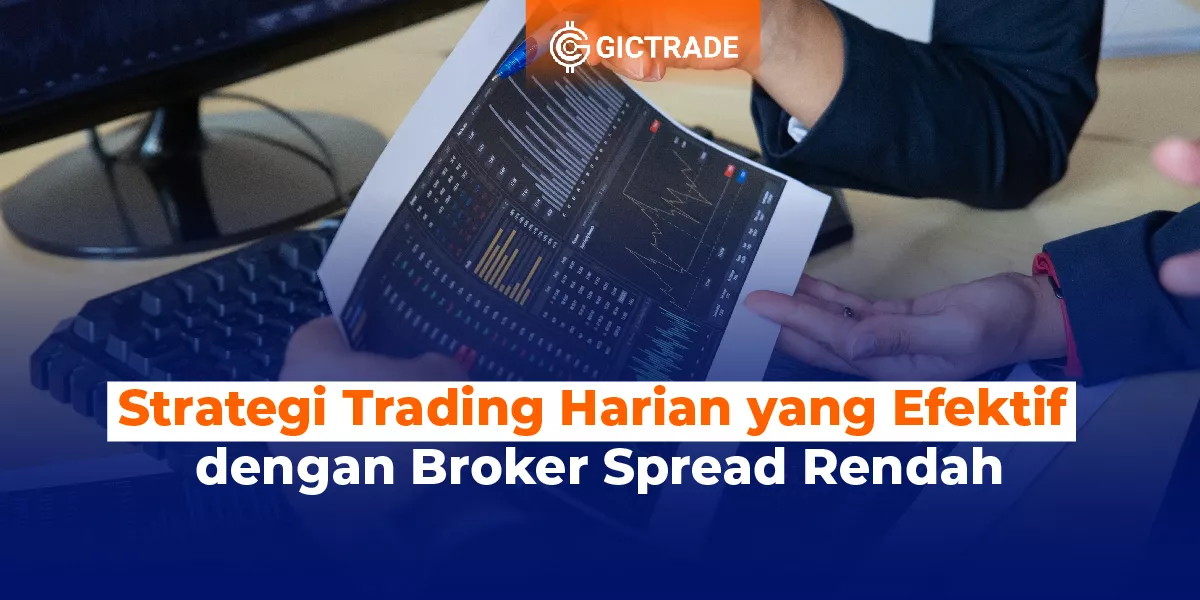Effective Daily Trading Strategies - In the world of financial trading, having an effective strategy is key to achieving success. For day traders, having a broker with low spreads is crucial. Low spreads help reduce trading costs and increase potential profits.
In this article, we will discuss several effective daily trading strategies with low-spread brokers, enabling you to maximize your potential in the financial markets.
Table of Contents

Why Choose a Low-Spread Broker?
Before discussing effective daily trading strategies, let's understand why it's important to choose a broker with low spreads. The spread is the difference between the bid and ask prices of an asset. The lower the spread, the less cost you incur for trading, meaning you have more money to invest or take profit.
Understanding Market Volatility?
One critical aspect of an effective daily trading strategy is understanding market volatility. Financial markets can be highly volatile, and day traders need to identify opportunities in rapid price movements. With a low-spread broker, you can enter and exit trades with minimal costs, allowing you to respond quickly to market changes.
Why is Volatility Important?
Volatility is a double-edged sword in trading. On one hand, high volatility can present significant opportunities for quick profits. On the other hand, it also carries greater risks. Therefore, day traders must understand volatility to make informed decisions.
Factors Affecting Volatility
Several factors can influence market volatility, including:
- Economic News: Announcements of significant economic news, such as employment reports, inflation, or monetary policy changes, can trigger substantial price changes.
- Geopolitical Events: Geopolitical conflicts, wars, or political instability in a country or region can significantly affect financial markets.
- Earnings Reports: Company earnings reports can cause significant fluctuations in stock prices.
- Trends and Technical Patterns: Technical patterns in price charts often influence volatility, especially if there is a breakout or breakdown from the pattern.
- Trading Volume: High trading volume can amplify market volatility, especially if many traders enter or exit the market simultaneously.
Strategies to Handle Volatility
To navigate market volatility, day traders need suitable strategies. Some steps you can take include:
- Risk Management Plan: Define your risk limits and use stop-loss orders to protect your capital.
- Proper Asset Selection: Choose assets that align with your risk tolerance. Some assets are more volatile than others.
- News and Economic Calendar: Monitor the economic calendar to know when significant economic news will be released, allowing you to anticipate price changes.
- Use of Analytical Techniques: Technical analysis can help identify potential entry and exit points in trades.
- Flexible Approach: Don’t be too rigid with your strategies. Sometimes, volatility can quickly change the situation, and you need to be able to adapt.
Careful Technical Analysis
One effective tool for day traders is technical analysis. This involves observing price charts to identify patterns and trends. With a low-spread broker, you can easily execute trades based on technical analysis without incurring high costs.
Portfolio Diversification
Diversification is key to reducing risk in trading. With a low-spread broker, you can easily purchase various asset types, such as stocks, currencies, and commodities, without worrying about high transaction costs. Diversification can help protect your portfolio from significant losses.
Wise Risk Management
As a day trader, you should always have a solid risk management plan. This includes setting stop-loss and take-profit levels to control losses and lock in profits. With a low-spread broker, you can set these levels more efficiently, allowing you to sleep soundly without worrying about drastic price changes.
Using Fundamental Analysis
In addition to technical analysis, fundamental analysis is also important in daily trading. This involves researching economic factors and news that can affect the markets. Low-spread brokers allow you to enter and exit trades quickly when significant news events occur.
Join GIC, the Safest Low-Spread Broker in Indonesia for Beginner Traders
Forex brokers offering low spreads are highly sought after by scalping strategy advocates. Scalping involves many transactions in one day, and in this scenario, commissions can reach up to 100 pips. To reduce costs in forex trading, traders opt for transaction desks with low spreads.
Some traders even consider this a primary factor in their choice of broker. With low spreads, potential financial losses can be minimized, which is the primary goal for many traders: seeking profits and protecting their capital.
The registered brokers here offer various types of spreads, both floating and fixed, but they always maintain a low to moderate level. While a large initial deposit may be required, brokers providing micro and mini accounts also allow trading in small amounts. GIC is one of the brokers offering low spreads, making it an excellent choice for you.
With a peer-to-peer (P2P) approach, GICTrade can offer competitive and low spreads. The market maker's role in providing instant liquidity can reduce spreads and slippage in trading.
Additional benefits, such as no commissions and swap-free trading, make GICTrade a very trader-friendly platform. Once you understand about brokers with low spreads, you can start trading with GIC and enjoy the lowest spreads we offer.
Conclusion
Effective daily trading strategies with low-spread brokers are key to achieving success in the competitive financial markets. Choosing a broker with low spreads allows you to reduce trading costs and be more flexible in decision-making. With a solid understanding of market volatility, careful technical and fundamental analysis, and wise risk management, you can enhance your chances of success as a day trader.
FAQ (Frequently Asked Questions)
What is spread in trading?
The spread is the difference between the bid and ask prices of an asset. The lower the spread, the less cost is incurred by traders.
Why is it important to choose a low-spread broker?
Choosing a broker with low spreads can reduce trading costs and increase a trader's potential profits.
What is technical analysis in daily trading?
Technical analysis involves observing price charts to identify patterns and trends that can be used to make trading decisions.
How can i diversify my portfolio in trading?
Portfolio diversification involves purchasing various types of assets, reducing the risk of significant losses if one asset declines in value.
Why is risk management important in daily trading?
Risk management helps traders control losses and lock in profits.
 Last:
Last: 







